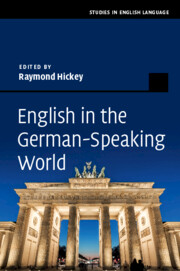Book contents
- English in the German-Speaking World
- Studies in English Language
- English in the German-Speaking World
- Copyright page
- Contents
- Figures
- Tables
- Contributors
- Preface
- Chapter 1 English in the German-Speaking World: The Nature and Scale of Language Influence
- I The Status of English
- II The Transmission of English
- III Domains and Features of English
- Chapter 8 Anglophone Practices in Berlin: From Historical Evidence to Transnational Communities
- Chapter 9 English in the German-Speaking World: Immigration and Integration
- Chapter 10 Processes of Language Contact in English Influence on German
- Chapter 11 Persistent Features in the English of German Speakers
- Chapter 12 Compiling a Speech Corpus of German English: Rhoticity and the BATH Vowel
- Chapter 13 A Question of Direction: German Influence on English
- IV Beyond Germany
- Index
- References
Chapter 10 - Processes of Language Contact in English Influence on German
from III - Domains and Features of English
Published online by Cambridge University Press: 11 November 2019
- English in the German-Speaking World
- Studies in English Language
- English in the German-Speaking World
- Copyright page
- Contents
- Figures
- Tables
- Contributors
- Preface
- Chapter 1 English in the German-Speaking World: The Nature and Scale of Language Influence
- I The Status of English
- II The Transmission of English
- III Domains and Features of English
- Chapter 8 Anglophone Practices in Berlin: From Historical Evidence to Transnational Communities
- Chapter 9 English in the German-Speaking World: Immigration and Integration
- Chapter 10 Processes of Language Contact in English Influence on German
- Chapter 11 Persistent Features in the English of German Speakers
- Chapter 12 Compiling a Speech Corpus of German English: Rhoticity and the BATH Vowel
- Chapter 13 A Question of Direction: German Influence on English
- IV Beyond Germany
- Index
- References
Summary
Many contributions in this volume highlight the important role of English in German-speaking areas where knowledge of the language is constantly increasing in the population and where English continues to be the major international voice in the multilingual repertoires of German and other language speakers (see chapters by Mair; Mollin; Fuller in this volume). This status of English goes hand in hand with its thorough implementation as the first learner language in schools across Austria, Germany, and German-speaking Switzerland, increasingly so from primary schools up to higher education (see chapters by Göpferich, Manchura, and Murphy; Klippel; Pfenninger and Watts; Smit and Schwarz, this volume). English has also developed into the major language of scientific publications dominating academic discourse globally (cf. contributions in Ammon 2001, 2004). In addition, as a global language, English has become part and parcel of popular culture as manifested in music, video games, and graffiti. It also appears in the linguistic landscape of German-speaking countries as in billboards and shop names (see, e.g., Knospe 2016; Soukoup 2016). Advertising language, youth jargon, the language of business and information technology, and terminology in a range of modern, popular sports are further domains in which English is present in German discourse. Major carriers of English influence are both traditional and new media, with the latter having become a particularly fertile ground for the use of English in German contexts.
- Type
- Chapter
- Information
- English in the German-Speaking World , pp. 185 - 207Publisher: Cambridge University PressPrint publication year: 2019
References
- 2
- Cited by



